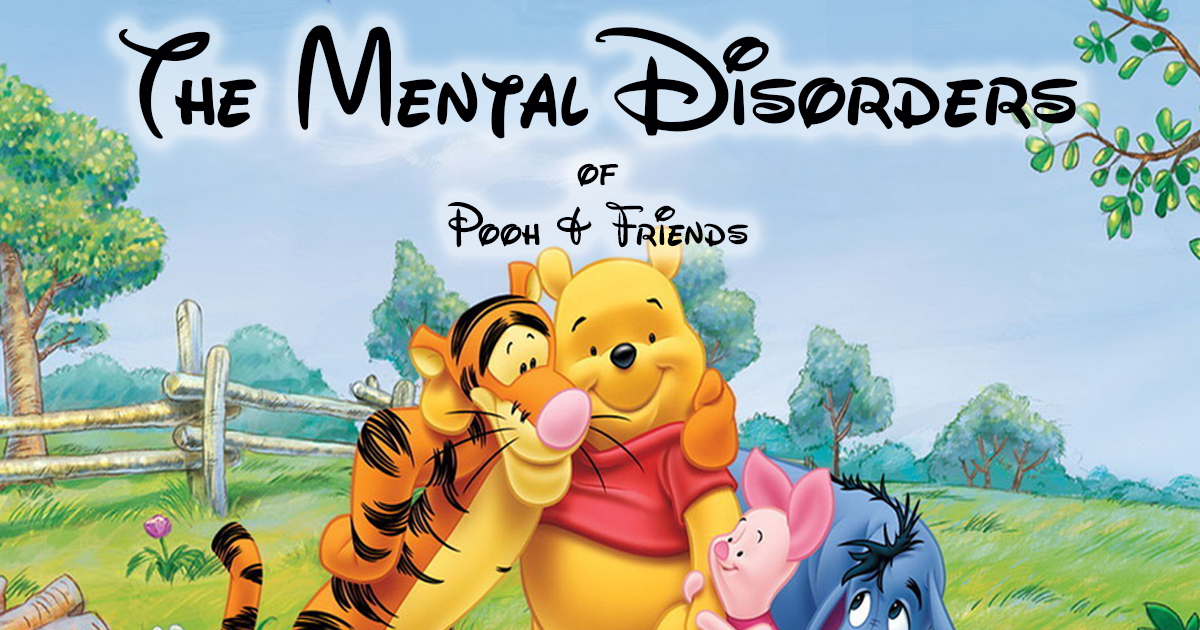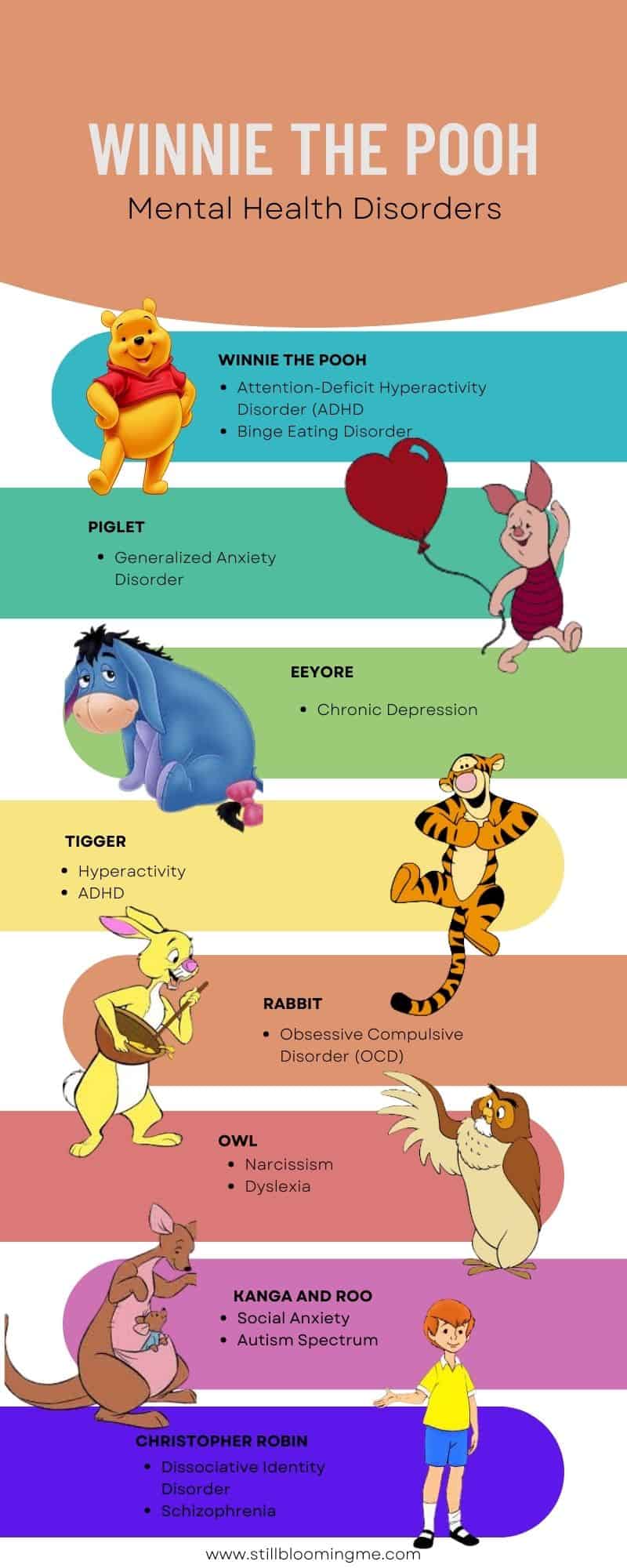Winnie The Pooh & Mental Health: Exploring Disorders In The Hundred Acre Wood
Can a children's story, beloved for its simplicity and charm, actually offer profound insights into the complexities of mental health? The seemingly innocent world of Winnie the Pooh and his friends provides a surprisingly rich tapestry for exploring psychological conditions.
The notion that the residents of the Hundred Acre Wood could be reflections of different mental health struggles isn't a new one. In fact, as far back as 2000, a paper published in the Canadian Medical Association Journal, titled "Pathology in the Hundred Acre Wood," delved into this very idea. A.A. Milne's creation, while appearing lighthearted on the surface, lends itself to a deeper examination of the characters' behaviors and emotional states. This exploration invites us to consider the "diagnosed" disorders the characters may represent. The key here is to delve into the psychological profiles of the main characters, examining the mental illnesses they potentially symbolize, and how we, as readers, can glean valuable lessons about mental health.
| Character | Possible Mental Disorder(s) | Key Behaviors/Symptoms |
|---|---|---|
| Winnie the Pooh | Eating Disorder, ADHD (Inattentive subtype) | Insatiable appetite for honey, impulsivity, obsessive fixations, scattered thoughts, forgetfulness, difficulty focusing. |
| Piglet | Generalized Anxiety Disorder (GAD) | Constant nervousness, worry, low self-esteem, frequent stuttering, fearful behavior. |
| Eeyore | Major Depressive Disorder (MDD) | Pessimism, low energy, sadness, lack of motivation, feelings of hopelessness. |
| Rabbit | Obsessive-Compulsive Disorder (OCD) | Preoccupation with order, planning, and control, repetitive behaviors. |
| Tigger | ADHD (Hyperactive-Impulsive subtype) | Hyperactivity, impulsiveness, difficulty staying still, excessive energy. |
Reference: Pathology in the Hundred Acre Wood: A Neurodevelopmental Perspective on A.A. Milne
- Movie Streaming Guide Your Ultimate Resource For Reviews More
- Hdhub4u Your Guide To Movies Hindi Tamil More Is It Safe
The question remains: What can Winnie the Pooh and his friends teach us about ourselves? Do the behaviors and symptoms exhibited by these beloved characters resonate with you or someone you know? This exploration, far from being a mere academic exercise, offers an opportunity for self-reflection and understanding. The potential for recognition of these conditions within oneself or others is a crucial first step. If any of the descriptions sound familiar, it might be the appropriate time to consider seeking professional help and treatment, because recognizing the signs and symptoms of a mental illness is the first step toward getting better.
Consider Eeyore, the perpetually melancholic donkey. Exploring his character allows us to delve into the complexities of depression. His gloomy disposition, his frequent pronouncements of doom, and his general lack of enthusiasm paint a picture of someone struggling with Major Depressive Disorder. A.A. Milne's creation offers a nuanced representation of this condition, providing a starting point for discussions about recognizing and addressing depression. The subtle yet meaningful portrayal of depression in "Winnie the Pooh" has had a lasting impact on mental health awareness. Milne, even without intending to, has contributed to a broader conversation about mental health that continues to unfold.
The characters of Winnie the Pooh are relatable because they each display a wide range of behaviors and emotional characteristics, and the impact of the stories have shaped the conversation around mental health. The seemingly simple stories of Winnie the Pooh have profoundly influenced the conversations around mental health, making it easier for people to talk about the struggles they are facing. The stories provide a soft introduction to complex topics, which facilitates more open and understanding discussions. These stories make it possible for readers to connect with characters that are facing challenges, and in doing so, make the reader feel less isolated in their own struggles.
- Discovering Movies On Mkvmoviespoint Your Guide To Downloads
- Sky Cinema Discover Movies More No Results Tips
Indeed, a study of the characters of Winnie the Pooh, led by Kevin Gordon (M.D.) and associates, concluded that each character could be linked to a definite psychiatric diagnosis. The fan theory that the disorders of characters in Winnie the Pooh was conceived by the Canadian Medical Association. The researchers' conclusions serve as the cornerstone of this exploration. They propose that Pooh's insatiable appetite and obsession with honey are indicative of an eating disorder, while his impulsivity and inattentiveness suggest Attention Deficit Hyperactivity Disorder (ADHD). Piglet, perpetually nervous and fearful, is seen as a representation of Generalized Anxiety Disorder (GAD). Eeyore's consistent pessimism and lack of energy are linked to Major Depressive Disorder (MDD). Rabbit's preoccupation with order and detail reflects Obsessive-Compulsive Disorder (OCD), and Tigger's boundless energy aligns with ADHD.
The notion of "Pooh Pathology" examines the characters of the Hundred Acre Wood through a psychological lens. This "playful analysis" allows readers to connect with the characters on a deeper level, fostering a greater understanding of mental health conditions and how these impact an individual's behavior and overall personality. The theory has a profound effect on mental health awareness and education. Through the use of familiar and beloved characters, the stories allow us to engage with mental health concerns and struggles through a gentle and accessible format. Moreover, these stories open up a range of discussions and allow us to understand the issues more fully.
In a world that often shies away from discussions about mental health, the stories of Winnie the Pooh offer a gentle, inviting entry point. It is a testament to the power of storytelling. Through the simple narrative of the Hundred Acre Wood, we are given a chance to engage with complex topics and to initiate conversations that might otherwise be difficult. These discussions serve as a reminder that mental health affects everyone. It can impact anyone from a child to an adult.
Take, for example, Winnie the Pooh himself. According to researchers, Pooh's behaviors suggest he suffers from more than one neurological disorder, and the one that stands out the most is his attention deficit. The researchers claim that the most striking is his attention deficit hyperactivity disorder (ADHD). Specifically, his ADHD is of the inattentive subtype, exhibited in his scattered, disordered thoughts, random remarks, and forgetfulness. His eating habits and obsession with honey further support this. Winnie the Pooh has an eating disorder because he is addicted to honey. He is also impulsive and obsessive when it comes to honey, which he eats straight from the pot. Furthermore, Pooh exhibits a number of comorbidities (different disorders occurring at the same time).
Piglet, on the other hand, embodies the struggles of an anxiety disorder. He lives his life in an anxious whirl. He is perpetually nervous or scared. Piglet's character shows how anxiety affects a person, including how they feel, and how they react to the world around them. Piglet's behavior exemplifies the symptoms of Generalized Anxiety Disorder, the constant state of worry and the fear that goes along with it.
The seemingly simple world of Winnie the Pooh presents a way to talk about challenging subjects, such as mental illness. The stories of these characters, which at first glance appear innocent, offer a unique perspective, that allows us to understand ourselves and those around us better. Winnie the Poohs stories have influenced conversations about mental health. It has opened up new avenues for discussion and understanding. The subtle yet meaningful representation of mental health challenges has had a lasting impact on mental health awareness.
The lessons from the Hundred Acre Wood extend far beyond the pages of the books. The characters' experiences offer a framework for discussing mental health. The Winnie the Pooh franchise has been entertaining children and families for generations, and has shown that, by introducing these themes in a beloved childrens story, A.A. Milne has contributed to a broader conversation about mental health that spans generations.



Detail Author:
- Name : Mrs. Ruth Thompson
- Username : tjacobi
- Email : maida.kerluke@carroll.info
- Birthdate : 2001-09-02
- Address : 14328 Zieme Causeway East Zionbury, WI 47917-2631
- Phone : 574-722-7691
- Company : Corkery-Gibson
- Job : Manufactured Building Installer
- Bio : Quos provident earum sed enim ullam aut. Earum aut voluptatum non. Incidunt molestiae voluptate praesentium. Voluptatibus laudantium ducimus voluptas impedit culpa consequuntur.
Socials
instagram:
- url : https://instagram.com/jensen_mohr
- username : jensen_mohr
- bio : Incidunt id fugiat est. Est et illo voluptatem iure nulla. Iusto totam nesciunt cupiditate sint.
- followers : 2616
- following : 2798
tiktok:
- url : https://tiktok.com/@jensenmohr
- username : jensenmohr
- bio : Blanditiis non deleniti eum eaque ut delectus nobis. Non incidunt saepe in.
- followers : 1108
- following : 2866
linkedin:
- url : https://linkedin.com/in/jensen.mohr
- username : jensen.mohr
- bio : Voluptatum tempore ut quo vel qui adipisci.
- followers : 1763
- following : 297
facebook:
- url : https://facebook.com/jensen.mohr
- username : jensen.mohr
- bio : Iusto quas omnis minima quo.
- followers : 4999
- following : 1346
twitter:
- url : https://twitter.com/jensen_mohr
- username : jensen_mohr
- bio : Harum exercitationem aut ratione. Est voluptas voluptas sequi ullam ullam repudiandae. Magni sit aut ex earum qui velit omnis.
- followers : 4795
- following : 1288